Tesco and the Global Business Environment: A Detailed PESTLE Report
VerifiedAdded on 2023/06/18
|5
|843
|230
Report
AI Summary
This report provides a PESTLE analysis of Tesco's global business environment, focusing on the impact of political, economic, social, technological, legal, and environmental factors. It highlights the effects of COVID-19, Brexit, and changing consumer trends on Tesco's operations. The analysis identifies key challenges and opportunities, including the increasing cost of raw materials, the shift to online shopping, and the need for enhanced safety measures. The report concludes that Tesco has been significantly affected by the pandemic, necessitating strategic adjustments to overcome risks and improve overall performance. This document is available on Desklib, where students can find a wide range of study resources.
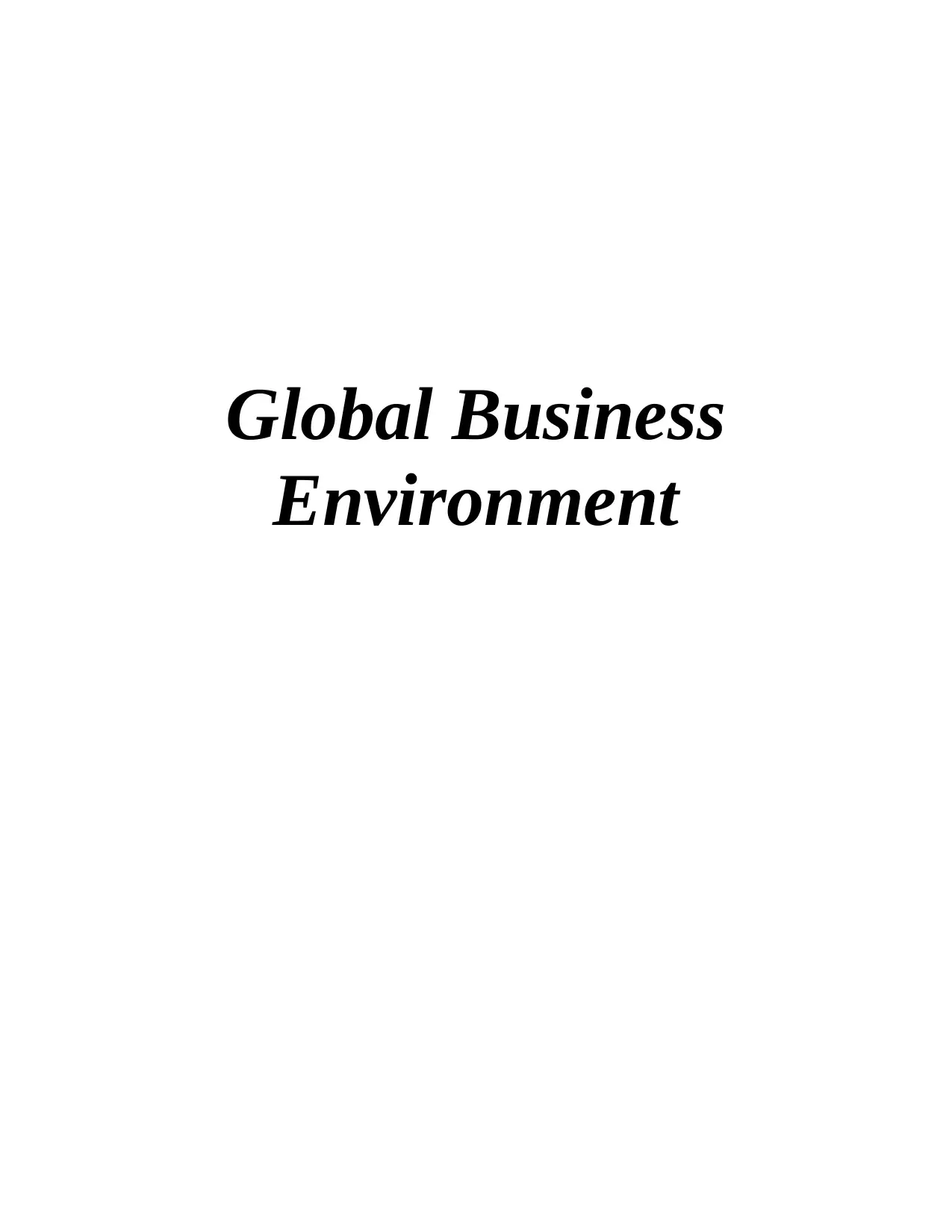
Global Business
Environment
Environment
Paraphrase This Document
Need a fresh take? Get an instant paraphrase of this document with our AI Paraphraser
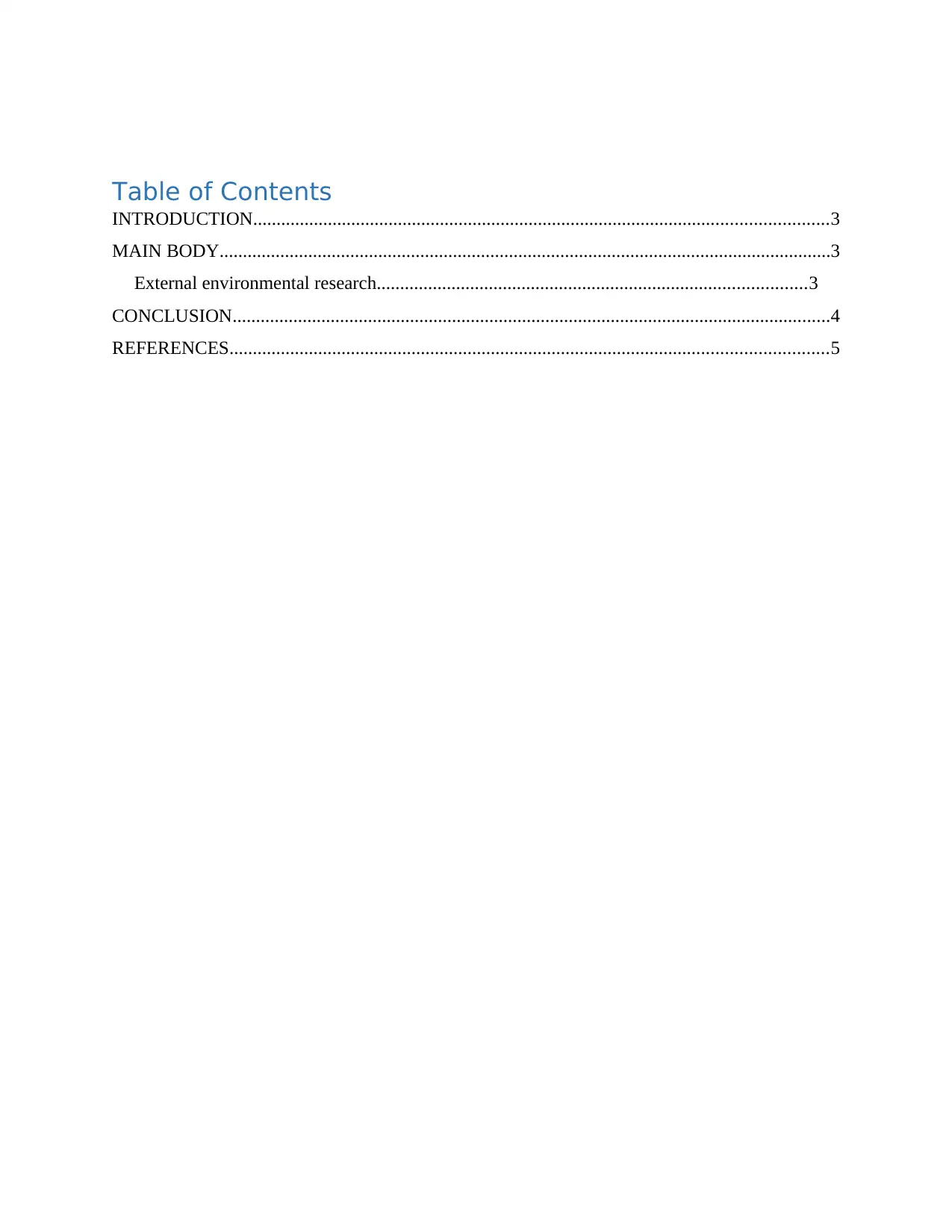
Table of Contents
INTRODUCTION...........................................................................................................................3
MAIN BODY...................................................................................................................................3
External environmental research............................................................................................3
CONCLUSION................................................................................................................................4
REFERENCES................................................................................................................................5
INTRODUCTION...........................................................................................................................3
MAIN BODY...................................................................................................................................3
External environmental research............................................................................................3
CONCLUSION................................................................................................................................4
REFERENCES................................................................................................................................5
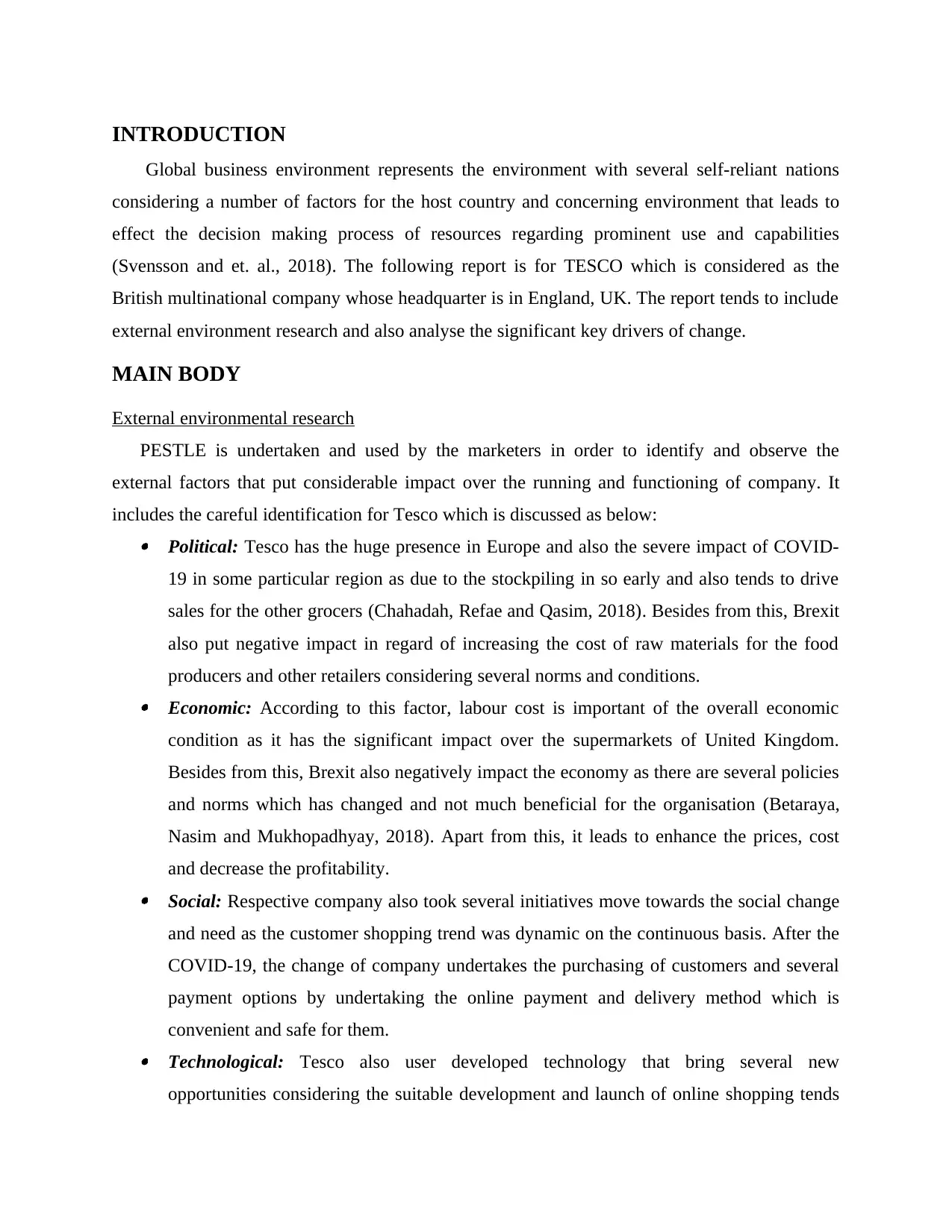
INTRODUCTION
Global business environment represents the environment with several self-reliant nations
considering a number of factors for the host country and concerning environment that leads to
effect the decision making process of resources regarding prominent use and capabilities
(Svensson and et. al., 2018). The following report is for TESCO which is considered as the
British multinational company whose headquarter is in England, UK. The report tends to include
external environment research and also analyse the significant key drivers of change.
MAIN BODY
External environmental research
PESTLE is undertaken and used by the marketers in order to identify and observe the
external factors that put considerable impact over the running and functioning of company. It
includes the careful identification for Tesco which is discussed as below: Political: Tesco has the huge presence in Europe and also the severe impact of COVID-
19 in some particular region as due to the stockpiling in so early and also tends to drive
sales for the other grocers (Chahadah, Refae and Qasim, 2018). Besides from this, Brexit
also put negative impact in regard of increasing the cost of raw materials for the food
producers and other retailers considering several norms and conditions. Economic: According to this factor, labour cost is important of the overall economic
condition as it has the significant impact over the supermarkets of United Kingdom.
Besides from this, Brexit also negatively impact the economy as there are several policies
and norms which has changed and not much beneficial for the organisation (Betaraya,
Nasim and Mukhopadhyay, 2018). Apart from this, it leads to enhance the prices, cost
and decrease the profitability. Social: Respective company also took several initiatives move towards the social change
and need as the customer shopping trend was dynamic on the continuous basis. After the
COVID-19, the change of company undertakes the purchasing of customers and several
payment options by undertaking the online payment and delivery method which is
convenient and safe for them. Technological: Tesco also user developed technology that bring several new
opportunities considering the suitable development and launch of online shopping tends
Global business environment represents the environment with several self-reliant nations
considering a number of factors for the host country and concerning environment that leads to
effect the decision making process of resources regarding prominent use and capabilities
(Svensson and et. al., 2018). The following report is for TESCO which is considered as the
British multinational company whose headquarter is in England, UK. The report tends to include
external environment research and also analyse the significant key drivers of change.
MAIN BODY
External environmental research
PESTLE is undertaken and used by the marketers in order to identify and observe the
external factors that put considerable impact over the running and functioning of company. It
includes the careful identification for Tesco which is discussed as below: Political: Tesco has the huge presence in Europe and also the severe impact of COVID-
19 in some particular region as due to the stockpiling in so early and also tends to drive
sales for the other grocers (Chahadah, Refae and Qasim, 2018). Besides from this, Brexit
also put negative impact in regard of increasing the cost of raw materials for the food
producers and other retailers considering several norms and conditions. Economic: According to this factor, labour cost is important of the overall economic
condition as it has the significant impact over the supermarkets of United Kingdom.
Besides from this, Brexit also negatively impact the economy as there are several policies
and norms which has changed and not much beneficial for the organisation (Betaraya,
Nasim and Mukhopadhyay, 2018). Apart from this, it leads to enhance the prices, cost
and decrease the profitability. Social: Respective company also took several initiatives move towards the social change
and need as the customer shopping trend was dynamic on the continuous basis. After the
COVID-19, the change of company undertakes the purchasing of customers and several
payment options by undertaking the online payment and delivery method which is
convenient and safe for them. Technological: Tesco also user developed technology that bring several new
opportunities considering the suitable development and launch of online shopping tends
⊘ This is a preview!⊘
Do you want full access?
Subscribe today to unlock all pages.

Trusted by 1+ million students worldwide
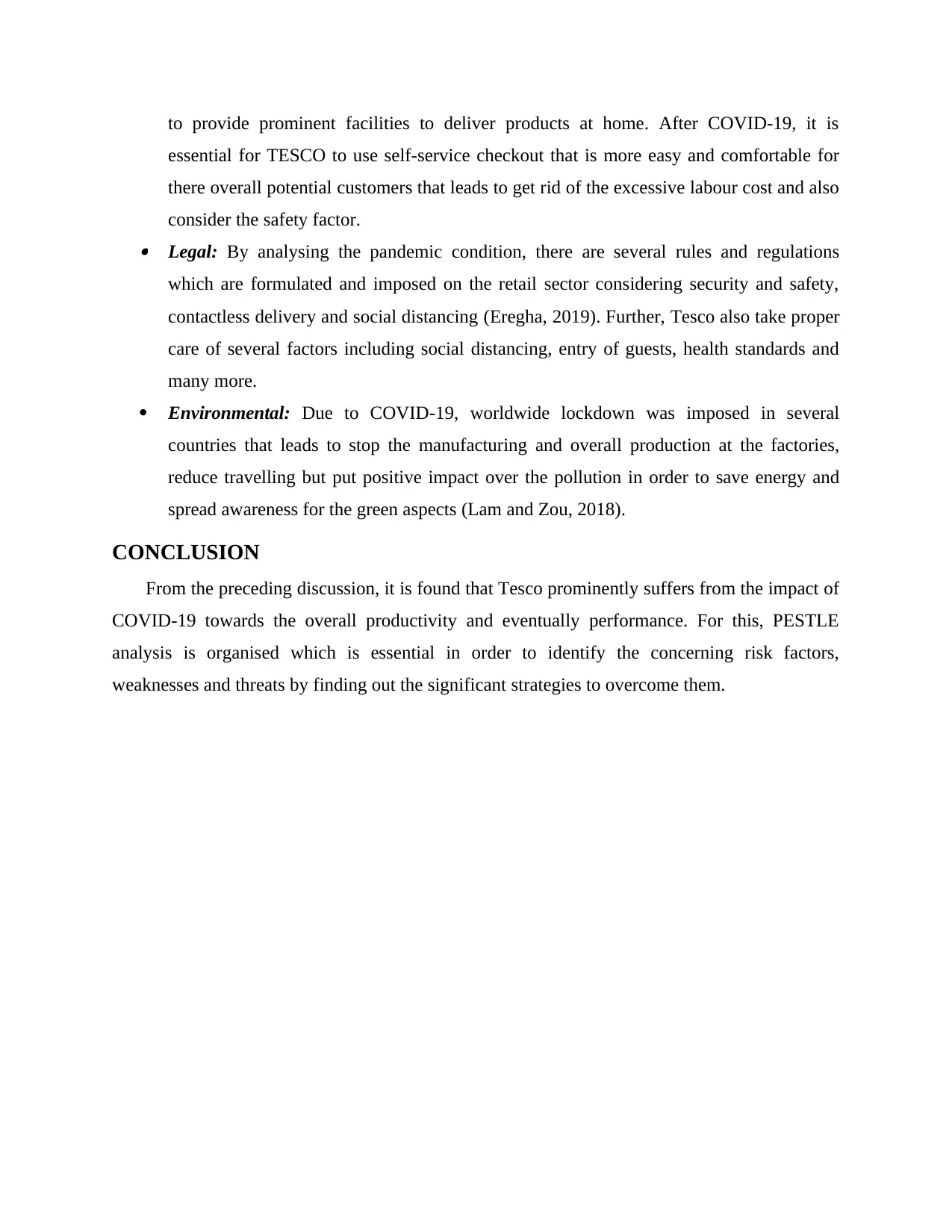
to provide prominent facilities to deliver products at home. After COVID-19, it is
essential for TESCO to use self-service checkout that is more easy and comfortable for
there overall potential customers that leads to get rid of the excessive labour cost and also
consider the safety factor. Legal: By analysing the pandemic condition, there are several rules and regulations
which are formulated and imposed on the retail sector considering security and safety,
contactless delivery and social distancing (Eregha, 2019). Further, Tesco also take proper
care of several factors including social distancing, entry of guests, health standards and
many more.
Environmental: Due to COVID-19, worldwide lockdown was imposed in several
countries that leads to stop the manufacturing and overall production at the factories,
reduce travelling but put positive impact over the pollution in order to save energy and
spread awareness for the green aspects (Lam and Zou, 2018).
CONCLUSION
From the preceding discussion, it is found that Tesco prominently suffers from the impact of
COVID-19 towards the overall productivity and eventually performance. For this, PESTLE
analysis is organised which is essential in order to identify the concerning risk factors,
weaknesses and threats by finding out the significant strategies to overcome them.
essential for TESCO to use self-service checkout that is more easy and comfortable for
there overall potential customers that leads to get rid of the excessive labour cost and also
consider the safety factor. Legal: By analysing the pandemic condition, there are several rules and regulations
which are formulated and imposed on the retail sector considering security and safety,
contactless delivery and social distancing (Eregha, 2019). Further, Tesco also take proper
care of several factors including social distancing, entry of guests, health standards and
many more.
Environmental: Due to COVID-19, worldwide lockdown was imposed in several
countries that leads to stop the manufacturing and overall production at the factories,
reduce travelling but put positive impact over the pollution in order to save energy and
spread awareness for the green aspects (Lam and Zou, 2018).
CONCLUSION
From the preceding discussion, it is found that Tesco prominently suffers from the impact of
COVID-19 towards the overall productivity and eventually performance. For this, PESTLE
analysis is organised which is essential in order to identify the concerning risk factors,
weaknesses and threats by finding out the significant strategies to overcome them.
Paraphrase This Document
Need a fresh take? Get an instant paraphrase of this document with our AI Paraphraser
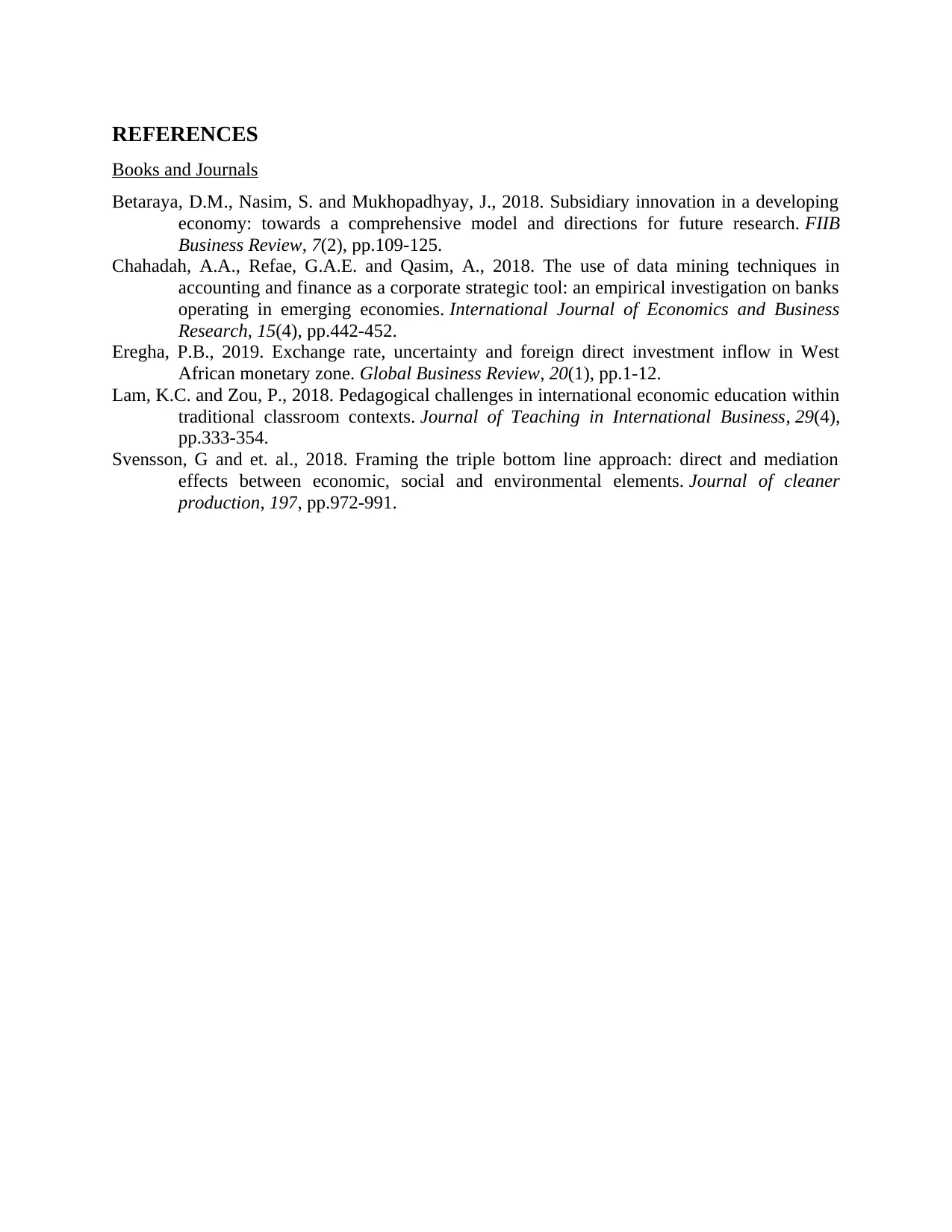
REFERENCES
Books and Journals
Betaraya, D.M., Nasim, S. and Mukhopadhyay, J., 2018. Subsidiary innovation in a developing
economy: towards a comprehensive model and directions for future research. FIIB
Business Review, 7(2), pp.109-125.
Chahadah, A.A., Refae, G.A.E. and Qasim, A., 2018. The use of data mining techniques in
accounting and finance as a corporate strategic tool: an empirical investigation on banks
operating in emerging economies. International Journal of Economics and Business
Research, 15(4), pp.442-452.
Eregha, P.B., 2019. Exchange rate, uncertainty and foreign direct investment inflow in West
African monetary zone. Global Business Review, 20(1), pp.1-12.
Lam, K.C. and Zou, P., 2018. Pedagogical challenges in international economic education within
traditional classroom contexts. Journal of Teaching in International Business, 29(4),
pp.333-354.
Svensson, G and et. al., 2018. Framing the triple bottom line approach: direct and mediation
effects between economic, social and environmental elements. Journal of cleaner
production, 197, pp.972-991.
Books and Journals
Betaraya, D.M., Nasim, S. and Mukhopadhyay, J., 2018. Subsidiary innovation in a developing
economy: towards a comprehensive model and directions for future research. FIIB
Business Review, 7(2), pp.109-125.
Chahadah, A.A., Refae, G.A.E. and Qasim, A., 2018. The use of data mining techniques in
accounting and finance as a corporate strategic tool: an empirical investigation on banks
operating in emerging economies. International Journal of Economics and Business
Research, 15(4), pp.442-452.
Eregha, P.B., 2019. Exchange rate, uncertainty and foreign direct investment inflow in West
African monetary zone. Global Business Review, 20(1), pp.1-12.
Lam, K.C. and Zou, P., 2018. Pedagogical challenges in international economic education within
traditional classroom contexts. Journal of Teaching in International Business, 29(4),
pp.333-354.
Svensson, G and et. al., 2018. Framing the triple bottom line approach: direct and mediation
effects between economic, social and environmental elements. Journal of cleaner
production, 197, pp.972-991.
1 out of 5
Related Documents
Your All-in-One AI-Powered Toolkit for Academic Success.
+13062052269
info@desklib.com
Available 24*7 on WhatsApp / Email
![[object Object]](/_next/static/media/star-bottom.7253800d.svg)
Unlock your academic potential
Copyright © 2020–2026 A2Z Services. All Rights Reserved. Developed and managed by ZUCOL.





